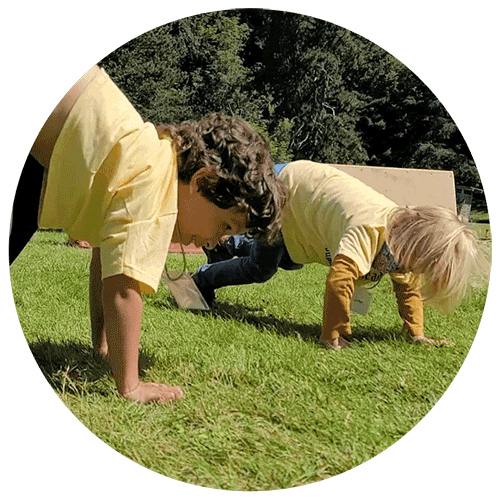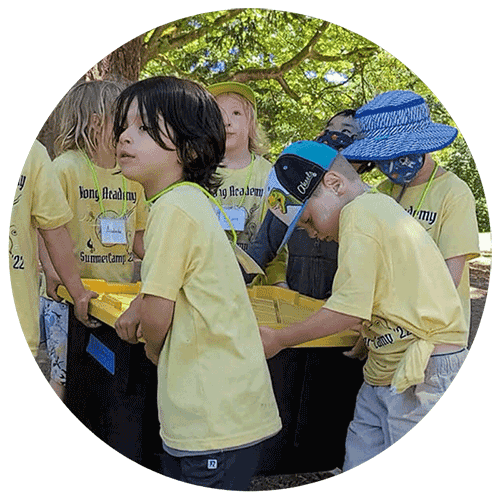Helping Kids Build Social Awareness & Relationship Skills
Social awareness as a skill is something that is talked about from teachers to psychologists to parents. We all seem to be aware when “little Johnny” or “little Alice” are particularly “bad” at social awareness, but helping kids to improve their social skills is something parents often need a little support with.


Often this is because there are many layers to social learning. Kids pick up direction on how to “be” with others from absolutely every angle: friends, classmates, teachers, their pets and other social creatures, other adults and yes, their parents. When mom or dad is socially awkward or unsure of themselves in relationships, it can be hard to model positive social skills to their kids. So kids need to learn the skill elsewhere or it can have challenging consequences down the road.
Luckily, kid’s brains are very malleable and in this context it means that kids have a great ability to learn something new.
At Kong Academy, we help kids grow their social awareness and relationship skills through play and fun . After all, that’s how kids are the most likely to try a new activity, explore a new skill or take a risk with a new friend. When the lesson is wrapped inside of “The Floor Is Lava” it’s a lot easier for a kid to do.

Why Are Social Skills So Important?
We are social creatures. Even the most shy among us usually have one or two vital people in their lives. Being social with peers through school work, after school activity or club or simply by being friends has a huge impact on a kid’s brain development, their self-esteem and their confidence.
Social skills are important because they are the gateways for how kids are accepted by their peers and included in activities. When kids lack social skills, they are often the kids last invited to a birthday party (or left out altogether), struggle to make friends and last picked for the team. These experiences lead kids to feel isolated and lonely.
Parents can support kids who struggle with social awareness and social emotional learning by getting them involved in programs that teach these all-important skills.
Social skills for kids can include all of the things on this list:
- Communication
- Understanding emotions
- Sharing feelings in a productive way
- Conflict resolution
- Independence
- Healthy risk-taking
- Impulse control
- Building strong brains
- Improving working memory
- Improving flexibility and physical strength
- Building confidence
- Responsible decision making
- Healthy respect for the environment
- Acting with compassion for others
- Empathy
- And FUN!!!
As kids grow up, socializing with peers is how kid’s find meaning and belonging with their peers. When social awkwardness is present, teachers and parents can level the playing field by connecting kids with like-minded interests or activities. This lessens the “social” part of being with others and instead, concentrates on the task at hand.
For kids who are shy, have learning differences, neurodiversity, or who are simply unsure of themselves, participating in social activities that are designed to teach social emotional learning give kids an easy way to interact socially with others without all the pressure and retain the benefits of being social.

Why Starting Early Is Important When It Comes To Social Awareness Skills
Social skills, like most other skills, build over time. The earlier a child starts to practice positively playing and being aware of others, the more likely they are to leapfrog through the skills without stress, developmental delays or social challenges.
What’s important to remember is that kids have milestones for social skills based on their age, so it’s important that activities designed to “improve social awareness are adjusted to the developmental age of the child. At Kong Academy, we have age-driven milestones for social skills that our counselors and coaches work with every day and with every student. We do this to support kids in making their natural milestones as they grow in our program.
How Kong Academy Uses Play And Games To Teach Valuable Social Skills
We use games to support kids in the easiest way possible with learning new social skills and awareness. Below are some of the games we play and the social awareness skills being worked on behind the scenes.
The Player Is More Important Than The Game – People over the Game (precursor to teaching respect).
Respect – Playing together, playing fair, and playing by the rules.
Communication – What is listening? Verbal and non-verbal listening cues
Conflict Resolution – Be calm, listen to understand & solve together.
Being a Helper – How to ask for and receive help.
